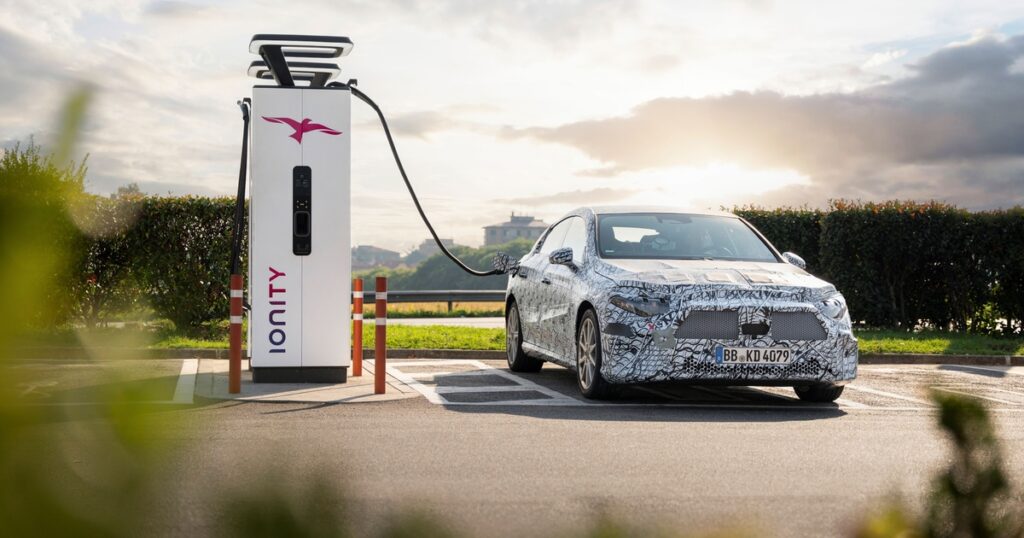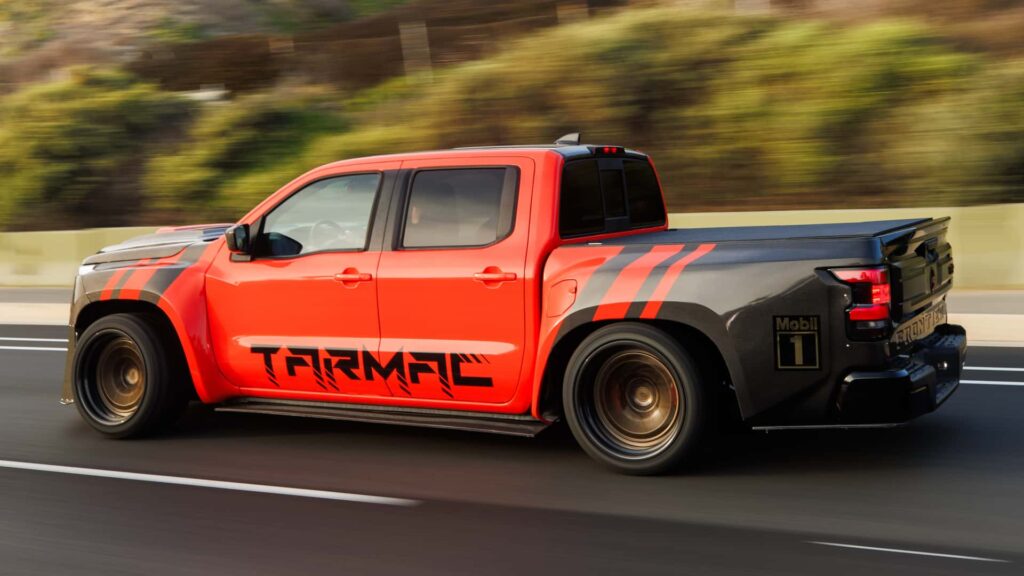Mercedes-Benz releases details of a new electric-vehicle distance record set during testing of its third-generation CLA at the Nardò test track in southern Italy.
Building on a series of EV benchmarks established by the sleek EQXX engineering concept in recent years, a prototype of the new sedan covered a total distance of 2,309.6 miles (3,717 km) within a 24-hour period, according to the German automaker.
The achievement surpasses by 181.4 miles (292 km) the previous 24-hour record set by Porsche and its Taycan on the same 7.9-mile (13-km) banked oval in 2019.
Based on the Mercedes-Benz Modular Architecture (MMA) platform, the CLA is the first of four compact electric production models the automaker plans to launch by the end of 2026, including successors to today’s CLA Shooting Brake, EQA and EQB.
All four models feature a newly developed 800V electric architecture – the first of its kind to be used by a series-production Mercedes-Benz – in combination with new-generation electric motors, heat pumps and the MB:OS operating system revealed in 2023.
The CLA prototype used for the record attempt was taken from a fleet of production-based engineering mules of the new sedan already undergoing durability testing ahead of its planned launch later this year. It ran alongside a backup prototype with identical specifications, setting the new 24-hour benchmark on April 7.
A team of engineers located at Mercedes-Benz’s Electric Software Hub in Sindelfingen, Germany, assisted personnel at Nardò for the record attempt, using real-time data to remotely track the CLA’s progress and telemetry, as well as assisting with plotting the timing and duration of battery recharging stops.
With the CLA’s top speed limited to 131 mph (210 km/h), Mercedes-Benz says it was not aiming for an outright speed record during its record attempt. However, a clever charging strategy enabled a team of drivers to average 96.3 mph (154.9 km/h) for the duration of the attempt, including time taken for stops, bettering the record set by Porsche and its Taycan in 2019 by 7.6 mph (12.2 km/h).
Each of the two prototypes used in the 24-hour record run featured a driver and front-seat passenger, as well as data loggers and other test equipment.
Together with the impressive claimed efficiency of the new Mercedes-Benz model, one of the keys to the record-breaking distance recorded was a “plug and dash” charging strategy developed to maximize driving time. Rather than dipping deeply into the energy reserves of the new sedan’s battery during long driving periods before recharging, Mercedes-Benz opted for shorter driving stints paired with frequent charging stops.
CLA distance trials employed shorter driving stints, more frequent charging stops.
“Regular charging brings a decisive advantage in both distance and time efficiency – essentially, how many miles can be driven for every minute of charging,” explains Christian Pfeiffer, team lead of Mercedes-Benz’s latest electric-drive system.
The CLA prototype underwent a total of 40 recharges during the 24-hour attempt, each lasting around 10 minutes. “This resulted in an overall stop time of around 400 minutes,” says Pfeiffer.
Overall, the CLA engineering prototype was stationary for close to 28%, or approximately 6 hours and 40 minutes of the 24-hour record attempt.
The short but regular stops enabled Mercedes-Benz to take advantage of a boost function that allows a high initial charging rate on a DC system compared to the average achieved over longer charging periods.
Mercedes-Benz has yet to reveal the charging capacity of its upcoming electric model, developed under the internal codename C174, but it has previously hinted it will be capable of accepting around 250 kW, with an additional 50-kW boost function allowing it to reach 300 kW for short periods, enabling a 248.5-mile (400-km) top-up within 15 minutes of connecting to a high-powered charger.
The energy capacity of the new model’s lithium-ion battery also remains undisclosed, though it is claimed to be around 89.6 kWh. This is said to provide an overall range of up to 466 miles (750 km) and combined average consumption in the most energy-efficient model of around 5.2 miles (8.4 km)/kWh.
Production versions are also expected to offer a less energy-dense lithium-ion-phosphate unit as an alternative.
The CLA used in the record attempt was a rear-wheel-drive model featuring a single rear-mounted synchronous electric motor and 2-speed transmission. Again, technical details are yet to be divulged, though Mercedes-Benz is claimed to be developing its new sedan with drivetrains offering between 202 hp and up to 537 hp in an AMG-branded dual-motor, all-wheel-drive performance model.
Despite being developed as an “electric first” model, the sedan will also be sold with an internal-combustion engine in the form of a turbocharged 2.0L 48V mild-hybrid unit with an integrated starter motor mounted within its gearbox in a model codenamed C178.
Developed by Mercedes-Benz, the gasoline 4-cyl. will be produced in China by Horse Powertrain, a company jointly operated by Chinese automaker Geely and France’s Renault. Leaked specifications reveal the new powertrain develops 249 hp and up to 266 lb.-ft. (361 Nm) of torque in an initial state of tune, although this is yet to be confirmed by Mercedes-Benz.The third-generation CLA will be revealed by the end of the year, with North American sales set to begin in 2025. Initial models will be electric only, with the gasoline engine option becoming available in selected markets about six months after its launch, according to Mercedes-Benz officials.


